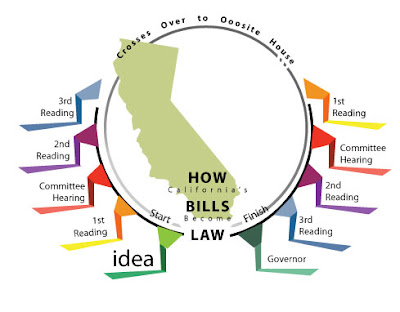Overview of Legislative Process in The State of California.
The California State Legislature is made up of two houses: the Senate and the Assembly. There are 40 Senators and 80 Assembly Members representing the people of the State of California.
The Legislature maintains a legislative calendar governing the introduction and processing of the legislative measures during its two-year regular session..
Idea
All legislation begins as an idea or concept. Ideas and concepts can come from a variety of sources. The process begins when a Senator or Assembly Member decides to author a bill.
The Author
A legislator sends the idea for the bill to the Office of the Legislative Counsel, where it is drafted into bill form. The draft of the bill is returned to the legislator for introduction. If the author is a Senator, the bill is introduced in the Senate. If the author is an Assembly Member, the bill is introduced in the Assembly.
First Reading/Introduction
A bill is introduced or read the first time when the bill number, the name of the author, and the descriptive title of the bill are read on the floor of the house. The bill is then sent to the Office of State Publishing. No bill except the Budget Bill may be acted upon until 30 days have passed from the date of its introduction.
Committee Hearings
After introduction, a bill goes to the rules committee of the house, where it is a assigned to the appropriate policy committee for its first hearing. Bills are assigned to policy committees according to subject area. For example, a Senate bill dealing with health care facilities would first be assigned to the Senate Health and Human Services Committee for policy review. Bills that require the expenditure of funds must also be heard in the fiscal committees, Senate Appropriations and Assembly Appropriations. Each committee is made up of a specified number of Senators or Assembly Members.
During the committee hearing the author presents the bill to the committee, and testimony may be heard in support or opposition to the bill. The committee then votes on whether to pass the bill out of committee, or that it be passed as amended. Bills may be amended several times. It takes a majority vote of the committee membership for a bill to be passed and sent to the next committee or to the floor.
Each house maintains a schedule of legislative committee hearings. Prior to a bill's hearing, a bill analysis is prepared that explains the intended effect of the bill on current law, together with background information. Typically the analysis also lists organizations that support or oppose the bill.
Second and Third Reading
Bills passed by committees are read a second time on the floor in the house of origin and then assigned to third reading. Bill analyses are also prepared prior to third reading. When a bill is read the third time it is explained by the author, discussed by the Members, and voted on by a roll call vote. Bills that require an appropriation, or that take effect immediately, ordinarily require 27 votes in the Senate and 54 votes in the Assembly to be passed. Other bills generally require 21 votes in the Senate and 41 votes in the Assembly. If a bill is defeated, the Member may seek reconsideration and another vote.
Repeat Process in Other House
Once the bill has been approved by the house of origin it proceeds to the other house where the procedure described above is repeated.
Resolution of Differences
If a bill is amended in the second house, it must go back to the house of origin for concurrence, meaning agreement on those amendments. If the house of origin does not concur in those amendments, the bill is referred to a two-house conference committee to resolve the differences. Three members of the committee are from the Senate and three are from the Assembly. If a compromise is reached, the bill is returned to both houses for a vote.
Governor
If both houses approve a bill, it goes to the Governor. The Governor has three choices: sign the bill into law, allow it to become law without his or her signature, or veto it. A governor's veto can be overridden by a two-thirds vote in both houses. Most enacted bills go into effect on the first day of January of the next year. Urgency bills, and certain other measures, take effect immediately after they are enacted into law.
California Law Each bill that is passed by the Legislature and approved by the Governor is assigned a chapter number by the Secretary of State. These chaptered bills are statutes, and ordinarily become part of the California Codes. The California Codes are a comprehensive collection of laws grouped by subject matter.
The California Constitution sets forth the fundamental laws by which the State of California is governed. All amendments to the California Constitution come about as a result of constitutional amendments approved by the voters at a statewide election.
From http://www.leginfo.ca.gov
Idea
All legislation begins as an idea or concept. Ideas and concepts can come from a variety of sources. The process begins when a Senator or Assembly Member decides to author a bill.
The Author
A legislator sends the idea for the bill to the Office of the Legislative Counsel, where it is drafted into bill form. The draft of the bill is returned to the legislator for introduction. If the author is a Senator, the bill is introduced in the Senate. If the author is an Assembly Member, the bill is introduced in the Assembly.
First Reading/Introduction
A bill is introduced or read the first time when the bill number, the name of the author, and the descriptive title of the bill are read on the floor of the house. The bill is then sent to the Office of State Publishing. No bill except the Budget Bill may be acted upon until 30 days have passed from the date of its introduction.
Committee Hearings
After introduction, a bill goes to the rules committee of the house, where it is a assigned to the appropriate policy committee for its first hearing. Bills are assigned to policy committees according to subject area. For example, a Senate bill dealing with health care facilities would first be assigned to the Senate Health and Human Services Committee for policy review. Bills that require the expenditure of funds must also be heard in the fiscal committees, Senate Appropriations and Assembly Appropriations. Each committee is made up of a specified number of Senators or Assembly Members.
During the committee hearing the author presents the bill to the committee, and testimony may be heard in support or opposition to the bill. The committee then votes on whether to pass the bill out of committee, or that it be passed as amended. Bills may be amended several times. It takes a majority vote of the committee membership for a bill to be passed and sent to the next committee or to the floor.
Each house maintains a schedule of legislative committee hearings. Prior to a bill's hearing, a bill analysis is prepared that explains the intended effect of the bill on current law, together with background information. Typically the analysis also lists organizations that support or oppose the bill.
Second and Third Reading
Bills passed by committees are read a second time on the floor in the house of origin and then assigned to third reading. Bill analyses are also prepared prior to third reading. When a bill is read the third time it is explained by the author, discussed by the Members, and voted on by a roll call vote. Bills that require an appropriation, or that take effect immediately, ordinarily require 27 votes in the Senate and 54 votes in the Assembly to be passed. Other bills generally require 21 votes in the Senate and 41 votes in the Assembly. If a bill is defeated, the Member may seek reconsideration and another vote.
Repeat Process in Other House
Once the bill has been approved by the house of origin it proceeds to the other house where the procedure described above is repeated.
Resolution of Differences
If a bill is amended in the second house, it must go back to the house of origin for concurrence, meaning agreement on those amendments. If the house of origin does not concur in those amendments, the bill is referred to a two-house conference committee to resolve the differences. Three members of the committee are from the Senate and three are from the Assembly. If a compromise is reached, the bill is returned to both houses for a vote.
Governor
If both houses approve a bill, it goes to the Governor. The Governor has three choices: sign the bill into law, allow it to become law without his or her signature, or veto it. A governor's veto can be overridden by a two-thirds vote in both houses. Most enacted bills go into effect on the first day of January of the next year. Urgency bills, and certain other measures, take effect immediately after they are enacted into law.
California Law Each bill that is passed by the Legislature and approved by the Governor is assigned a chapter number by the Secretary of State. These chaptered bills are statutes, and ordinarily become part of the California Codes. The California Codes are a comprehensive collection of laws grouped by subject matter.
The California Constitution sets forth the fundamental laws by which the State of California is governed. All amendments to the California Constitution come about as a result of constitutional amendments approved by the voters at a statewide election.
From http://www.leginfo.ca.gov






